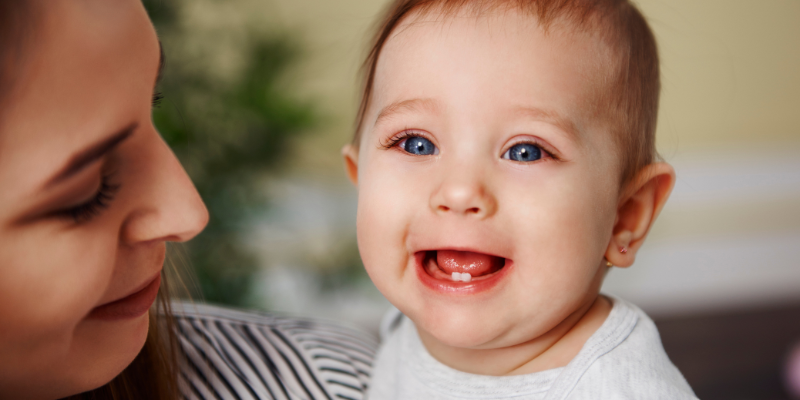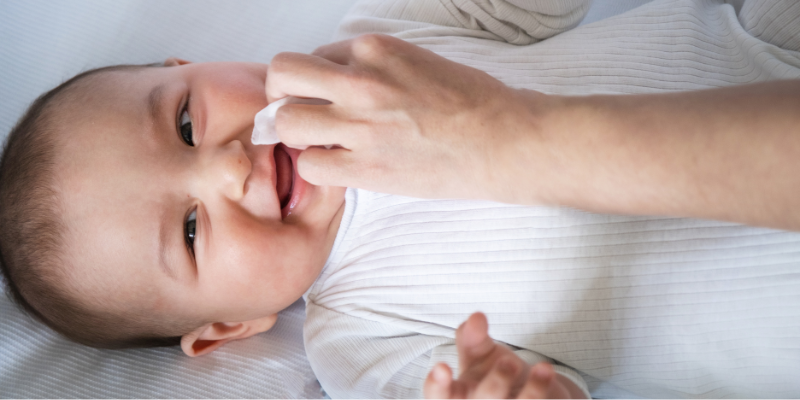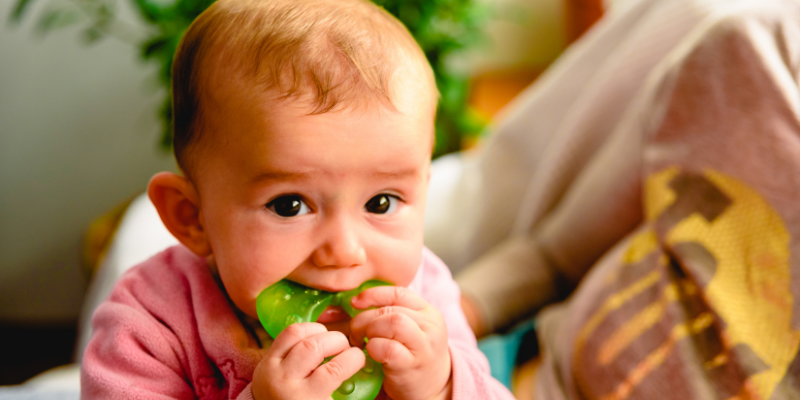The grinding of teeth, known in the dental world as bruxism, is a common problem that is found in people of all ages, including infants.
Teeth grinding can cause tremendous dental concerns when it becomes a habit, leading to eventual tooth, soft tissue, and hard tissue disease or loss. The key is for dental professionals to diagnose and treat grinding or bruxism in kids early so the pattern can be broken.
In this blog, we’ll look at the following:
- What causes a baby to grind their teeth?
- When to be concerned about your baby grinding their teeth
- What grinding teeth can possibly lead to
- How to stop your baby from grinding their teeth
What Causes A Baby To Grind Their Teeth?

Many parents want to know why their babies grind their teeth. According to the Nemours Foundation, an estimated 2 to 3 out of every 10 children will grind their teeth or clench their jaw.
In truth, the underlying causes can vary widely from baby to baby. However, researchers suggest that the following reasons typically contribute to the beginning of frequent bruxism behaviors:
Teething
When a baby’s teeth begin to come in, they must become accustomed to the feeling of having something new in their mouths. As they teethe, infants and toddlers sometimes begin to bite down on their gums to relieve the painful sensations they’re experiencing. Over time, this biting may continue, even after the teeth are fully in place and the pain has subsided.
Anxiety
Yes, even babies can feel stress! Like adults, they don’t always have healthy outlets to deal with their emotions, so they may begin unconsciously tensing up their jaws. This can not only lead to bruxism but also undue tension placed upon the temporomandibular joint of the jaw.
Malocclusions
This is a fancy term that means a baby’s bite is misaligned. In other words, the teeth haven’t come in straight. In an effort to make the misaligned teeth fit more comfortably, your baby may be unwittingly rubbing the tops of their teeth together.
Allergies and Nasal Problems
Some people believe that the underlying culprit of baby teeth grinding could relate to breathing issues. The suggestion is that when it’s difficult to get air, the infant or toddler bites down in a panicked state before opening his or her mouth to breathe.
Of course, there are other reasons that a baby develops a tooth-grinding routine. No matter why he or she begins the habit, it’s important to stop it.
When To Be Concerned About Your Baby Grinding Their Teeth
Teeth grinding that’s accompanied by ear pulling or food avoidance can indicate a more serious issue, such as an earache, headache, tooth eruption, or other infections. Likewise, bruxism is common in infants, and the good news is they typically outgrow teeth grinding. If your child is showing no signs of stopping despite time going on, it’s best to schedule an appointment with their dentist.
What Grinding Teeth Can Possibly Lead To

A small bout of bruxism that is caught early will not create a lifetime of problems for your baby. One study found that 36.8% of preschool children were reported as bruxists at least one night a week. However, teeth are not invincible to constant stressors such as biting. Eventually, bruxism can lead to several problems:
Enamel damage
The enamel (the outer layer of the tooth) is a protective coating that helps keep bacteria from damaging the tooth. When the enamel is slowly ground away, small, unprotected areas appear and can easily decay.
Increased cavities
As the teeth are worn down, the door is inevitably opened to the bacteria that foster the development of cavities. More cavities mean amplified trauma to the teeth at a young age.
Cracked teeth
Sometimes, pediatric dentists notice that babies with bruxism have teeth that are beginning to crack. These cracks must be filled in before they become too large.
Lost teeth
If teeth develop cracks that are big enough, the tooth can be damaged to the point where it either falls out or requires extraction. Even if baby teeth are extracted, continued tooth grinding can put permanent teeth in danger as well.
Aside from problems directly related to the teeth themselves, bruxism can also cause jaw pain. This leads to chronic soreness and headaches as well.
How To Stop Your Baby From Grinding Their Teeth

If your baby is developing a habit of teeth grinding, you can try several at-home solutions to control the problem, including,
- Cold teething toys and rings
- Wet washcloths
- Increasing fluid intake
- Scheduling longer or more frequent naps
- Reducing stress and anxiety triggers in their environment (loud music, bright lights, hyper animals, etc.)
If small efforts seem to make no difference, then the next step is contacting the professionals. At AZ Family Dental, we take a very personalized approach to tooth grinding in babies and toddlers. For example, if your baby is grinding their teeth but otherwise has a healthy mouth, we will likely just observe rather than instantly intervene. Sometimes, bruxism goes away on its own. On the other hand, if their teeth appear to be suffering as they grow older, preventative therapy steps may need to be taken.
When we move toward prevention, we have the ability to implement high-tech, proven procedures to solve the toughest infant bruxism cases. Some of our treatment options include specially-created dental guards, plans for the parents to help young children identify and replace tooth-grinding habits with healthier coping mechanisms, and even dental work if the teeth are severely misaligned.
By taking away all the barriers to good dental health and hygiene practices, your baby can enjoy smiling for a lifetime! All it takes is one check-up to determine if bruxism is an issue that we need to keep an eye on together. Contact AZ Family Dental today to schedule an appointment.
Published On: February 4, 2015
Updated On: November 13, 2023
